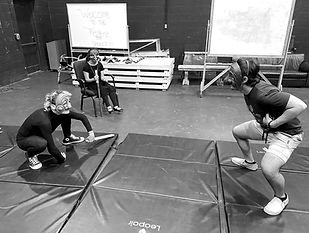
THEATRE TEACHING PHILOSOPHY



TEACHING PHILOSOPHY
As a theatre educator, my goal is to develop artists who honor the traditions of the art form while pursuing innovation with purpose and authenticity. I believe in cultivating students who are not only skilled performers but also thoughtful scholars and compassionate citizens—artists who recognize theatre’s power to reflect and enri society.
My teaching is rooted in equity, inclusion, and collaboration. I meet students where they are and guide them toward artistic and personal growth by creating a space that values every voice and story. I strive to shift traditional power dynamics within the classroom by inviting students to participate in meaningful dialogue and co-creation, ensuring that all perspectives are seen, heard, and respected.
Movement is at the core of my pedagogy. Using techniques drawn from Suzuki, Viewpoints, Laban, and Stanislavski, as well as Eastern performance traditions, I train students to approach storytelling from the feet up—connecting the body to impulse, imagination, and intention. I also incorporate mask performance (Larval, Commedia dell’Arte, full, and half mask) to heighten physical awareness and emphasize storytelling through gesture, rhythm, and breath. By removing reliance on the face and voice, students rediscover the expressive potential of the entire body.
As a director, I focus on the spiritual and ritualistic dimensions of theatre—exploring how performance serves as a form of collective healing and communication. I guide students to use cultural, political, and personal perspectives to build authentic, embodied characters and narratives that resonate deeply with audiences.
My teaching philosophy centers on three essentials: Craft, Movement, and Creation.
-
Craft: Students must first master traditional acting techniques before integrating modern methodologies, allowing them to adapt and remain grounded in any performance context.
-
Movement: The body is the actor’s first instrument. Training in movement systems empowers students to free their instincts and discover truth through physical expression.
-
Creation: Theatre is a living art. Students must not only study theory but practice it—by devising, directing, and performing work that reflects their voice and their community.
-
Ultimately, my teaching begins and ends with the student. I aim to nurture artists who move with intention, think with curiosity, and create with compassion—individuals who understand that theatre’s greatest purpose is to connect, to challenge, and to heal.